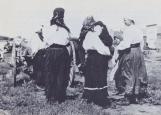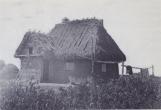1
Mary Orlecki tells about life on the homestead in Alberta where her parents settled in the early 1900s.3
My parents came to Canada in 1901 from the village of Toporivtsi, Bukovyna Province. They brought with them their son, my mother's younger brother and my father's sister's two children who had been orphaned. That made it six of them who emigrated together. They settled in the district of Warwick, Alberta, where they bought a homestead. I was born in 1908.This was a swampy, wooded district where the land had to be drained and cleared of trees before any cultivation could be done. My parents built a hovel for the family to live in. I remember it well. A plaque has been placed there to mark it as a historic spot.
What was our hovel like? It was a hole in the ground, with walls above ground built of crudely-dressed logs. My parents didn't have the right tools to dress the logs properly. They put up a roof, placed branches on top and then covered them with earth. An opening was left for the door, and a door made to close it. There were only openings in the walls for windows because there was no place where window panes could be bought. These let in the light during the day and were covered with towels for the night. For light in the evenings, we used homemade lamps, a wick suspended in a tin of kerosene. We as yet did not have a lamp with a glass chimney.
My mother's brother, Theodore Harasym, who was quite handy at making things, put up stone benches inside. We put dry grass on them and they served us for beds at night. In the centre of the hovel, we had a small table. A homemade stove, placed in one corner, heated the hovel and also served as an oven. We had a pot in which to cook, which my parents had brought from the old country. They had also brought a hand mill for grinding grain into flour.
My father came from a well-to-do family. He was still small when his father died. Being an orphan, my father worked as a janitor in the landlord's manor. He was barely literate. Having grown up under Romanian rule, he often spoke this language at home, so that I can still understand it today. My mother came from a very poor family. She had six sisters and two brothers and was the eldest child in the family. My brother went to Canada with my parents. The younger brother stayed behind in the old country. My mother's father was very sick for many years, so my mother had to work in the landowner's field, receiving every twelfth sheaf reaped as payment for her work. Her life was very difficult. When still a child, she had begun to go to school, but her father asked the authorities to exempt her from attending because he was sick and there was no one to work at home.
Later, my father's mother, who had remarried when her husband died, came to Canada and settled near our place. Her second husband came with her. My uncle, Theodore Harasym, had completed six grades of village school in the old country. He was an intelligent person and my father referred to him as being a socialist. This gave rise to frequent disputes in the family because my father used to reproach him for not believing in either the church or the priests. And, in fact, my uncle used to speak a good deal about world events to us three sisters, of whom I was the oldest, and he read poems by Taras Shevchenko to us. I must have been eight or nine years of age at the time. I was already attending the school called Luzhany, so named because there were many Ukrainian settlers there who had come from the village of Luzhany in Bukovyna Province. The school that I attended was a mile from our home. It was only open in the summertime because many children lived as far as eight miles away and couldn't attend in the wintertime. I attended school up to the age of sixteen.
My father went to Edmonton on foot to look for work. My mother, my uncle Harasym and my grandfather dug up five acres of land with spades. This earth is very dear to me and I kiss it every time that I visit the place.
My father was away from home for a whole year, working with some friends for sixty cents a day on the railroad in Strathcona. Whenever he sent home some money, my mother would go on foot to the store in Warwick and buy yeast, kerosene, salt and sugar. The store was a good nineteen miles away.
Later, my father bought a pair of horses so that he could drive to Edmonton to purchase supplies. It took a whole week to make the trip one way. The wagon often got stuck in the swampy terrain. The women who stayed behind at home never knew whether their husbands would return safely, or would drown somewhere in the swamp. When the men came back with the flour, sugar and salt, these essentials were shared with the neighbours.
An Orthodox church was built before there was a school in the district. A church minister used to come from Smoky Lake every once in a while to conduct services. My uncle, Theodore Harasym, and William Bohaychuk initiated community activities here. My uncle lived at Nick Orletsky's place. He and William Bohaychuk were referred to as socialists by other people. They held meetings in private homes, to which Didukh, who had quite some distance to come, and Nykodym were invited. This was in 1917 and 1918. These two people organized literary readings, also in private homes. William Bohaychuk later went to Toronto where he was active in the Ukrainian labour-farmer movement.
There was a call in these parts for marriageable girls in 1922. Miners who had put together some money and men, who already had their own farms, were looking for wives. Parents with several daughters of marriageable age were anxious to marry them off.
We were three grown-up sisters in our house. This is how my father saw the situation: "It would be a good thing if we could marry off our small daughter because no one is likely to want her. I'm not worried about the other two."
Dmytro Kasian came to our place in the capacity of marriage broker, acting on behalf of a certain Theodore Sykala, who had come from the village of Kucheriw. The latter was advanced in years. He had said to Dmytro Kasian that if the suit for my hand were to prove successful, he would pay him two hundred dollars. I was summoned home from school. I was only fourteen years old at the time.
The suitor seemed so huge and plain-looking when I saw him that I was almost overcome with fear. But he was rich, owned a whole section of land in Hilliard and had a well beneath the floor of his house so that water could be pumped directly into his kitchen, and he had ready cash. My father wanted to sign me out of school and marry me to this man.
The suitor brought some whiskey and he and my father imbibed a goodly amount. Then my father said to my mother: "She has to marry him!" My mother didn't want any of this, but there was nothing that she could do. She kept saying to my father: "But she's still a child. Whatever are you trying to do?"
My father forced me to get in the car and took me to Vegreville because a license had to be obtained before the marriage could take place. As soon as my father and the suitor went for the license, I jumped out of the car and ran to William Basarab's place to take refuge there. He is a very intelligent man. He is eighty-two years old now. He hid me out in a granary for two days. In the meantime, my father and the suitor looked for me for many hours but couldn't find me. The suitor went back home. My father was afraid that I had disappeared for good. And so ended the attempt to marry me off by force.
Actually, my father wasn't a bad man at all, but he had been a steward in the old country and was accustomed to command. When he issued an order, he expected it to be obeyed. For this reason we were all afraid of him.
I met William Orletsky some time after the above-mentioned events took place. He had completed high school and had returned to the farm. My father didn't want me to marry him because his sister had married Theodore Dmytruk in Drumheller, and he was a confirmed socialist. He belonged to the Ukrainian Labour Temple Association and was preparing to go to an agricultural commune in Soviet Ukraine. My father disliked socialists and for this reason didn't want me to keep company with William Orletsky. Sometimes he would say to me: "I am ashamed to show my face among people because of you - that fellow is a Bolshevik!"
Theodore Dmytruk left for the commune in Ukraine in 1922. I continued to keep company with William Orletsky. We were married in 1924.
MARY ORLECKI
EDMONTON, ALBERTA
interview by Peter Krawchuk

